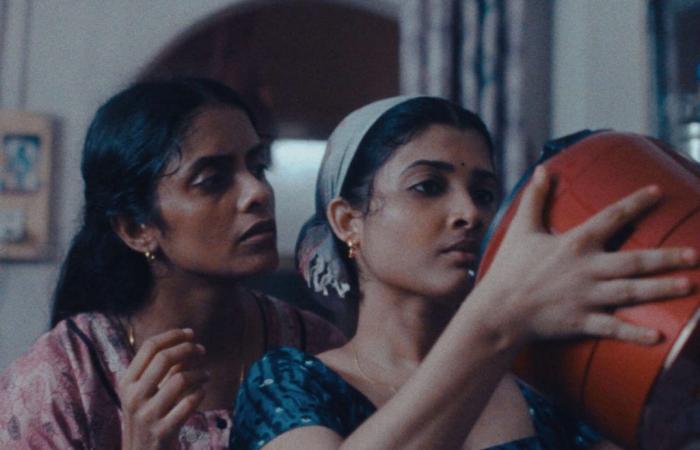In Mumbai, two friends try to find their way towards emancipation and desire, despite the weight of traditions.

The stern Prabha and the laughing Anu (Kani Kusruti and Divya Prabha), fellow nurses and roommates. Petit Chaos/Les Films Fauves/Arte France/Chalk & Cheese/Geko Films
By Jacques Morice
Published on October 1, 2024 at 5:30 p.m.
Updated October 1, 2024 at 5:48 p.m.
HHistorically, India is a great cinema country, not just for Bollywood. Few films, however, reach us from there, so that we have little news about the country and its inhabitants. All We Imagine as Light gives us some in a very beautiful way, in a personal chronicle tone, both intimate and modest. Payal Kapadia, 38, had already delighted us with All night without knowing (2022), a poetic-political documentary around a student strike, where archive images of a struggle and melancholic correspondence merged.
We find this taste for fragments in the credits of this first feature-length fiction film, where people from the countryside tell in voice-over their installation in Mumbai (Bombay) and their link with this cosmopolitan megalopolis. Which the director immediately takes the pulse of: crowded metro platforms, markets, hubbub, restaurants, extraneous noises, road traffic, large buildings, continuous flows. General atmosphere finely rendered, before we move on to the specific, getting to know Prabha and Anu, two close and different friends, who compete in confidence and gentle beauty.
They live together in a small apartment and are nurses at the hospital. In their way of providing care, delivering the pill or training the youngest by unabashedly designating the “vaginal speculum”, we quickly grasp what these women have acquired, in terms of autonomy and knowledge. The eldest, Prabha, in her forties, is married but her husband, who left for Germany, has not heard from her for a year. An immigrant doctor, distraught at speaking poorly in Hindi, delicately woos her and sends her a poem. But she stops herself from being sensitive to it. For her part, Anu, younger, has a shy Muslim boyfriend and would like to find a quiet place to make love with him. They kiss in corners, behind the groves along the football fields, in the parking lots. Anu talks with him freely about sex. Amused, she tells him how an apprentice nurse was panicked, during treatment, by the unexpected erection of an elderly patient.
One sings, the other doesn’t, you might think. As much as Anu is laughing and spontaneous, Prabha seems preoccupied, severe and prudish. Through these two emblematic heroines, the filmmaker confronts two generations of women, one still dependent on traditions, the other, contemporary, connected, a priori freer. His freedom is, in fact, relative. Anu must see her lover in secret, not only to protect herself from society but also from her family, whose authority she is still subject to. In small touches, the director slips nuances into these silky portraits, revealing what remains of prevented desires and barriers to break down to achieve real emancipation. This sociopolitical dimension is also embodied by a third middle-aged woman, a cook, without papers, helped by Prabha in her efforts. Combative, having been on the receiving end for years from a powerful developer who threatens to evict her from the accommodation she has occupied for twenty-two years, she ends up giving up by choosing to return to her native village. Where Prabha and Anu accompany him.
The film then leaves the city for a coastal village in the south of the country. Another world, which offers a new perspective, thanks to an episode imbued with a marvelous tale: a mysterious drowned man is brought back in a net… By thus subtly intertwining material life and floating states of mind, harshness and sensuality, in giving pride of place to transport and walks, despite the fear and constraint which mistreat the sorority in bloom, this kaleidoscope of saturated colors is touching. It is no coincidence that the film highlights the night so much, through the lights of the city like the colorful lanterns of a beachside bar. All these lights are indeed signs of life and hope.






